牛津译林版八年级下册英语Unit 5 Good manners知识点课件(共57张PPT)
文档属性
| 名称 | 牛津译林版八年级下册英语Unit 5 Good manners知识点课件(共57张PPT) | 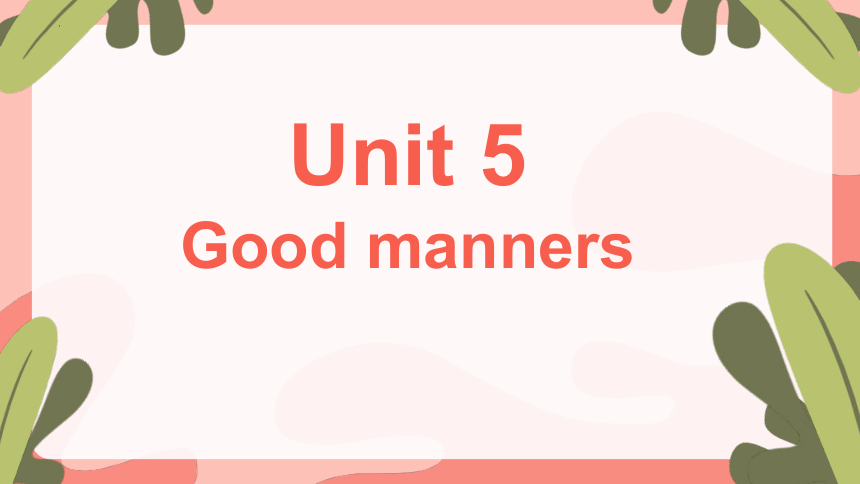 | |
| 格式 | zip | ||
| 文件大小 | 361.3KB | ||
| 资源类型 | 教案 | ||
| 版本资源 | 牛津译林版 | ||
| 科目 | 英语 | ||
| 更新时间 | 2022-03-01 13:52:29 | ||
图片预览



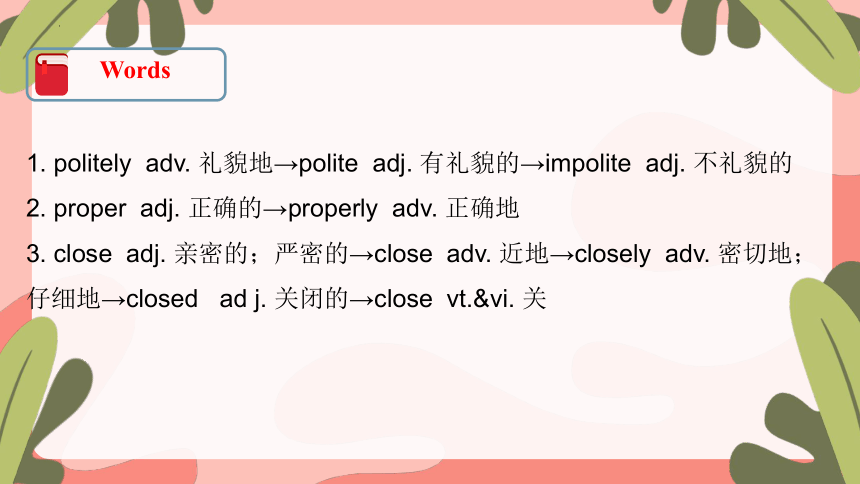
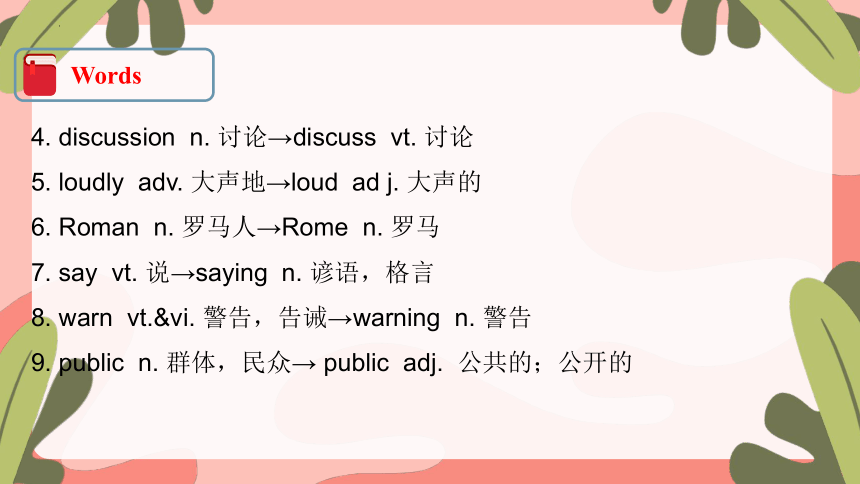
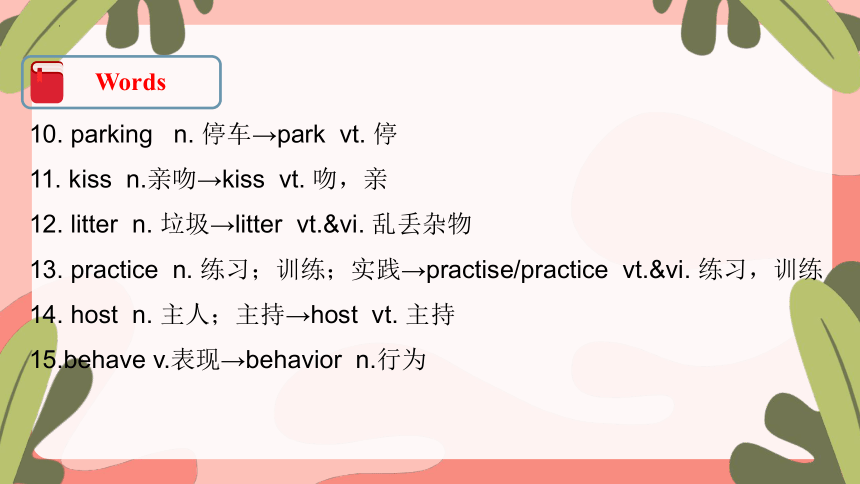
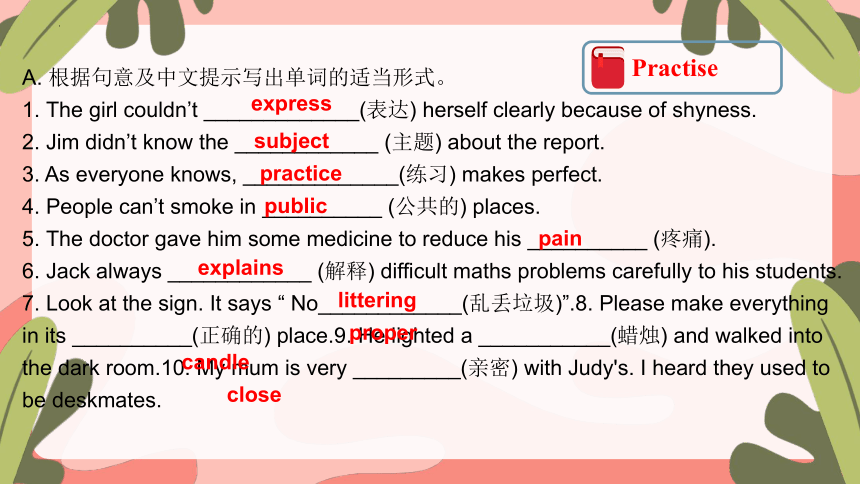
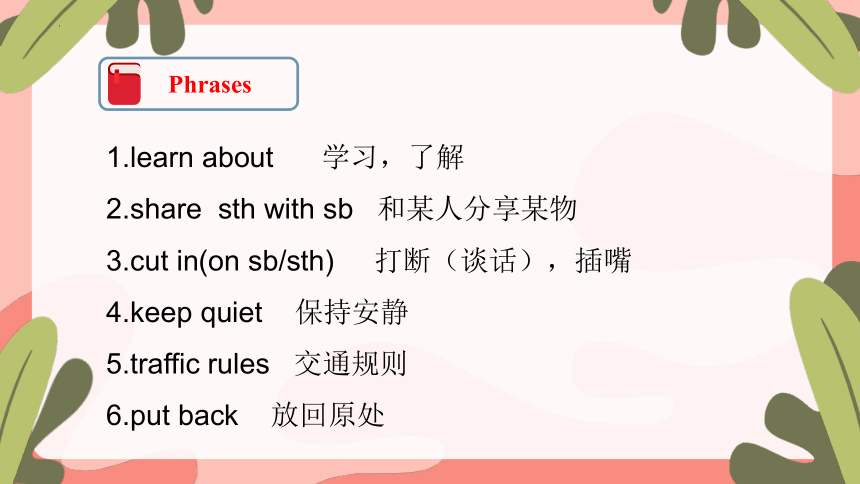
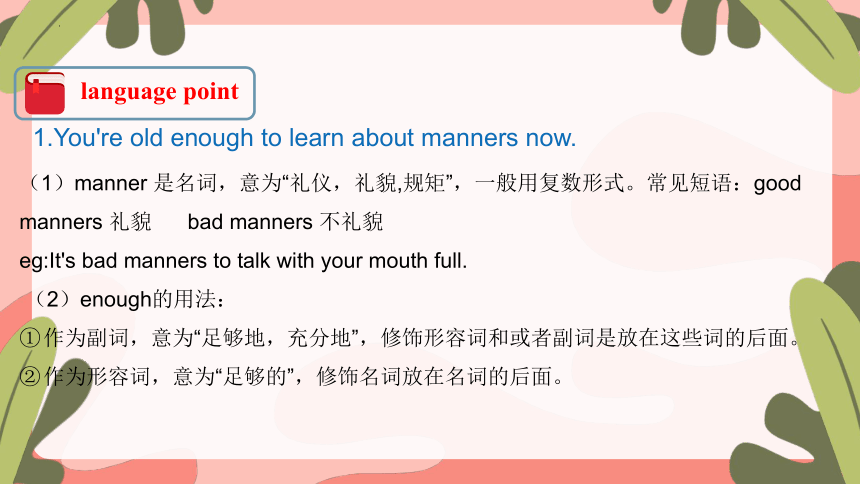
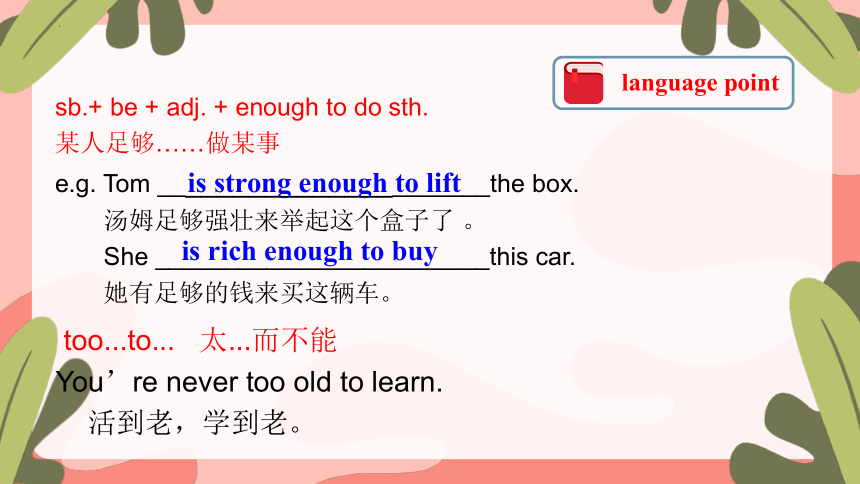
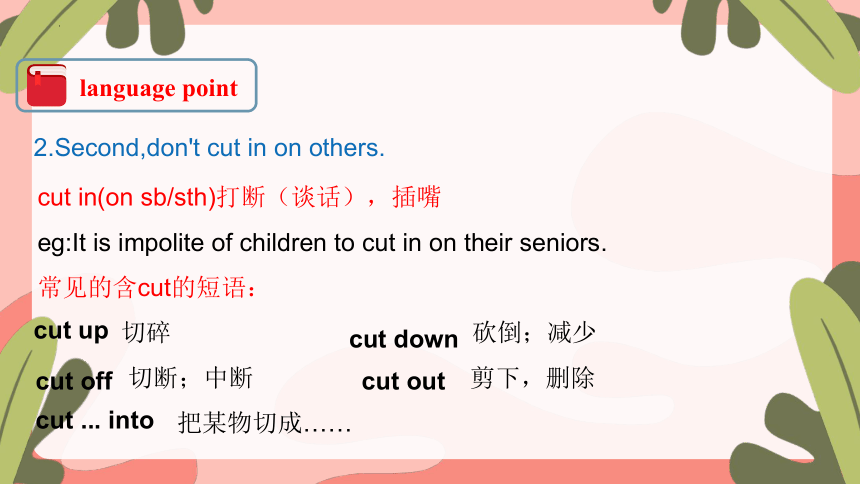
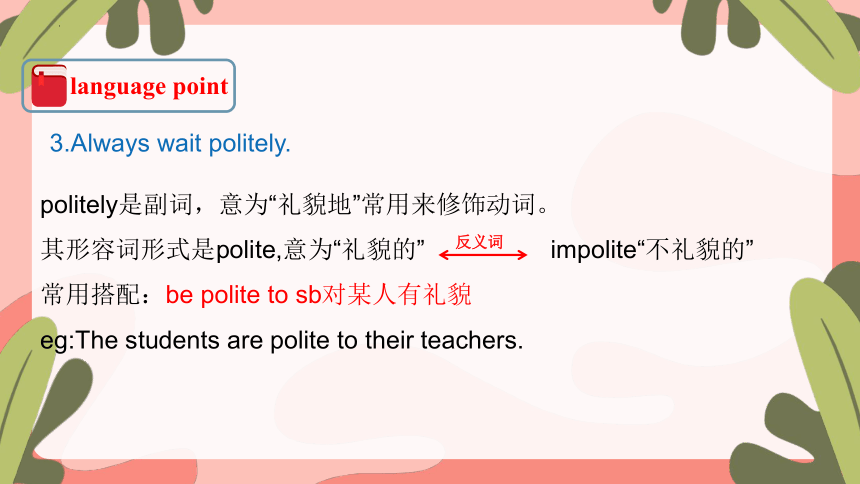
文档简介
(共57张PPT)
Unit 5
Good manners
01
Comic&Welcome
02
Reading
03
Grammar
04
Task
1
Comic &Welcome
Words
1. politely adv. 礼貌地→polite adj. 有礼貌的→impolite adj. 不礼貌的
2. proper adj. 正确的→properly adv. 正确地
3. close adj. 亲密的;严密的→close adv. 近地→closely adv. 密切地;仔细地→closed ad j. 关闭的→close vt.&vi. 关
Words
4. discussion n. 讨论→discuss vt. 讨论
5. loudly adv. 大声地→loud ad j. 大声的
6. Roman n. 罗马人→Rome n. 罗马
7. say vt. 说→saying n. 谚语,格言
8. warn vt.&vi. 警告,告诫→warning n. 警告
9. public n. 群体,民众→ public adj. 公共的;公开的
10. parking n. 停车→park vt. 停
11. kiss n.亲吻→kiss vt. 吻,亲
12. litter n. 垃圾→litter vt.&vi. 乱丢杂物
13. practice n. 练习;训练;实践→practise/practice vt.&vi. 练习,训练
14. host n. 主人;主持→host vt. 主持
15.behave v.表现→behavior n.行为
Words
A. 根据句意及中文提示写出单词的适当形式。
1. The girl couldn’t _____________(表达) herself clearly because of shyness.
2. Jim didn’t know the ____________ (主题) about the report.
3. As everyone knows, _____________(练习) makes perfect.
4. People can’t smoke in __________ (公共的) places.
5. The doctor gave him some medicine to reduce his __________ (疼痛).
6. Jack always ____________ (解释) difficult maths problems carefully to his students.
7. Look at the sign. It says “ No____________(乱丢垃圾)”.8. Please make everything in its __________(正确的) place.9. He lighted a ___________(蜡烛) and walked into the dark room.10. My mum is very _________(亲密) with Judy's. I heard they used to be deskmates.
express
subject
practice
public
pain
explains
littering
proper
candle
close
Practise
Phrases
learn about 学习,了解
share sth with sb 和某人分享某物
cut in(on sb/sth) 打断(谈话),插嘴
keep quiet 保持安静
traffic rules 交通规则
put back 放回原处
language point
1.You're old enough to learn about manners now.
(1)manner 是名词,意为“礼仪,礼貌,规矩”,一般用复数形式。常见短语:good manners 礼貌 bad manners 不礼貌
eg:It's bad manners to talk with your mouth full.
(2)enough的用法:
作为副词,意为“足够地,充分地”,修饰形容词和或者副词是放在这些词的后面。
作为形容词,意为“足够的”,修饰名词放在名词的后面。
sb.+ be + adj. + enough to do sth.
某人足够……做某事
e.g. Tom ______________________the box.
汤姆足够强壮来举起这个盒子了 。
She ________________________this car.
她有足够的钱来买这辆车。
is strong enough to lift
is rich enough to buy
language point
too...to... 太...而不能
You’re never too old to learn.
活到老,学到老。
2.Second,don't cut in on others.
cut in(on sb/sth)打断(谈话),插嘴
eg:It is impolite of children to cut in on their seniors.
常见的含cut的短语:
切碎 砍倒;减少
切断;中断 剪下,删除
把某物切成……
language point
cut up
cut off
cut ... into
cut out
cut down
language point
3.Always wait politely.
politely是副词,意为“礼貌地”常用来修饰动词。
其形容词形式是polite,意为“礼貌的” impolite“不礼貌的”
常用搭配:be polite to sb对某人有礼貌
eg:The students are polite to their teachers.
反义词
4.leave the tap running
(1)leave sth doing表示“使某物处在某种状态 ”。
动词ing形式作宾语补足语。作宾语补足语的可以是形容词、动词ing、副词等。
eg:You'd better leave the windows open.
Don't leave the machine running.
(2)run作为动词还可意为“经营,管理”
eg:They run the restaurant well.
5.obey traffic rules
obey意为“遵守,顺从”
常用短语:obey rules遵守规则 obey可与follow,keep互换。
其反义词为disobey或者break,意为“违反”
eg:Lucy obeyed her mother without questions.
Everyone must obey traffic rules,I can't disobey.
6.queue for your turn
(1)queue 用作动词,意为“(人、车等)排队等候”。
常用搭配:queue for“为……排队”
queue up(for sth) “排队等候……”
eg:Please queue up for the bus.
(2)turn用作名词:意为“轮流,(轮流的)顺序”
常用结构:
It's one's turn(to do sth)轮到某人(做某事)了
take turns to do sth=do sth in turn=do sth by turns轮流做某事
eg:It's your turn to make a decision.
【一词多义】 turn
A. v. 翻动(书页) B. v. 转弯 C. v. 转身
D. v. 变得 E. n. (依次轮到的)机会
判断下列句子中黑体词的词性及含义。
( )1. After hearing his words, her face turned red.
( )2. Tom, it’s your turn to do the dishes.
( )3. Turn to Page 33, please.
( )4. The boy turned around and saw his mother.
( )5. Turn right at the third crossing.
B
C
D
A
E
【关于turn的常用短语】
把...调低
关掉
把……调高
turn left 左拐
右拐
打开
turn down
turn off
turn up
turn right
turn on
7.Anything else
else为副词,意为“其他的,别的”,常用在不定代词、不定副词、疑问词或者疑问副词的后面。
eg:(1)There must be somebody else in the next room.
(2)Where else did she go and who else did she see
2
Reading
Phrases
shake sb's hands与某人握手
for the first time第一次
close friends亲密的朋友
in public公开的,在别人面前
push in插队,加塞
bump into 撞倒,碰到
in one's way挡住某人的路
Phrases
9.push past从……旁边挤过去
10.excuse me 劳驾
11.as well (as)也,还有
12.all the time一直
13.try not to do sth尽量不做某事
14.by accident偶然
language point
8.Today we've invited Jenny to talk about manners in the UK.
invite 是及物动词,意为“邀请”
固定搭配:
(1)invite sb to do sth邀请某人做某事
eg:He sometimes invites me to go to the concert.
(2)invite sb to+地点名词 邀请某人去某地
eg:We'll invite Tom to the zoo tomorrow.
9.Do they greet people with a kiss
greet sb with sth 以……方式问候
eg:Tom greeted me with “Hello”just now.
She _______________a smile.
她微笑着跟我们打了个招呼。
greeted us with
10.British people only greet relatives or close friends with a kiss.
(1)close用作形容词,意为“亲密的;严密的”
固定搭配:be close to sb与某人关系亲密
eg:We are close friends.
(2)close用作形容词,还可表示“(距离上)近的,接近的”
固定搭配:be close to “离……近”
eg:My home is close to the zoo.
11.But please avoid subjects like age,weight or money.
avoid为动词,意为“避免,回避”。
常用搭配:avoid sth 避免某事
avoid doing sth 避免做某事
eg:We should avoid the same mistakes.
He avoided answering my questions.
根据汉语意思完成英语句子。
(1) 我们必须认真做作业避免错误。
We must do our homework carefully to ______________.
(2) 王先生设法避免让他的经理生气。
Mr Wang tried to _____________ his manager angry.
avoid mistakes
avoid making
as well (as) 也,还有
e.g. I write my own songs and I play the guitar ________.
我自己写歌,也弹吉他。
as well
12.British people are very polite at home as well.
as well “也”,常用于肯定句或者疑问句,一般置于句末,无须用逗号和句子隔开。 Are they coming as well
too “也“,用在肯定句,位于句末,可有逗号也可没有 Lily will go to the park.I will go there too.
either “也“,用于否定句中,位于句末 It won't do them any good,but it won't do them any harm either.
also “也“,用于句中,常位于be动词、助动词、情态动词之后,行为动词之前 I’ve also seen a few of his earlier films.
他也会游泳 He can swim _______ ________
他也想去 He _______ wants to go
我也是个男孩 I'm a boy _______
他也不想去 He doesn't want to go _________
as well
also
too
either
13. What’s the proper way to greet people there, Jenny
珍妮,怎么恰当地和别人打招呼
proper adj. 符合习俗的;正确的
e.g. She ________________in her behaviour.
她的行为举止向来是规矩的。
is always proper
It is + adj. + (for sb.) + to do sth.
(对某人来说,)做某事……
句型中的it是形式主语,真正的主语是后面的to do sth.。
e.g. __________________British people how old they are.
问英国人多大年龄是不礼貌的。
14. They think it’s rude to push in before others.
他们认为插队是粗鲁的。
It is impolite to ask
15. If you’re in their way, they won’t touch you or push past you.
如果你挡了他们的路,他们不会碰你或从你身边过去。
in one’s way 挡住某人的路
e.g. I couldn't walk very fast because a lot of people ________________.
我不能走的很快,因为很多人挡了我的路。
A group of sheep _____ _____ _____ ______
一群绵羊挡住了我们的路
got in my way
are in our way
16. Just as the saying goes, “When in Rome, do as the Romans do.”
就像谚语所说,入乡随俗。
saying n. 谚语;格言
e.g. My grandma knows a lot of ___________ __________.
我的祖母知道很多英语格言。
English sayings
3
Grammar
A
enough to
B
too…to
A Using enough to
1.“主语+be+adj+enough+to do sth”这个句型用来描述主语的品质和能力,表示“某人在某方面已经达到能够做某事的程度”
该句型中常用来描述任务特征的形容词有:good、kind、nice、clever、careful、rude、wise、foolish、honest、outgoing…
例句:安迪足够外向,能很容易的交到朋友。
Andy is outgoing enough to make friends easily.
2.enough 修饰形容词时放在该形容词后面,修饰名词时放在该名词前面
例句:She is old enough to go to school.
We have enough money to rebuild our home.
3.“主语+be+adj+enough+to do sth”这个句型,可以和“so…that…”的肯定式互换。
例句:他足够高,能很容易地够到篮筐。
He is tall enough to reach the basket easily.
=He is so tall that he can reach the basket easily.
B Using too… to
1.“too+adj/adv+to do”结构简称为“too…to“结构。在大多数情况下表达一个否定的结果,通常可译为“太……而不能;太……无法……”。其结构的常用句型有两种:
(1)“too+adj/adv+to do”这个句型是too…to的基本句型。too后接形容词或者副词。
例句:The boy is too young to go to school.
(2)“too+adj/adv+for sb/sth+to do “结构中加上一个for sb/sth,引出动词不定式的逻辑主语,说明不定式所表示的行为动作是争对它的逻辑主语而言的。
例句:English is too difficult for me to learn well.
【注意】
在使用“too+adj/adv+for sb/sth+to do “结构时要注意当主语和不定式的宾语是指同一事物时,宾语不能重复,必须省掉,有时甚至其后的to do 也可以省去。
例句:这个箱子太重了。
1.This box is too heavy for me to carry it.
2.This box is too heavy for me to carry.
2.too…to结构之前带有but、only、all、never、not时,译作“非常……”“十分……“
例句:I am but too glad to do so. 我非常乐意这样做。
We are only too happy to live in China.生活在中国,我们真是太幸福了。
3.too…to结构中,若to后面所接的动词为不及物动词,须加上适当的介词。
例句:The room is too small for us to live in.
4.“too+adj+to do”句型可以与“so……that”的否定式或者“not+adj+enough+to do(该结构中的形容词与too…to结构中的形容词为反义词)”转换。
例句:这个男孩太矮了,够不到架子上的书。
The boy is too short to reach the books on the shelf.
=The boy is so short that he can't reach the books on the shelf.
=The boy is not tall enough to reach the books on the shelf.
1. He was so excited that he couldn’t go to sleep.
He was ______ _______ _______ go to sleep.
2. My son is too young to join the army.
My son isn’t _______ ________ to join the army.
3. The box is so heavy that I can’t carry it.
The box is _______ heavy _______ _______ _______ carry.
4. The book is so interesting that everybody likes to read it.
The book is _______ ______ _______ everybody to read.
5. The Maths problem is too difficult for me to work out.
The Maths problem isn’t ______ ______ for me _______ work out.
Practise
too excited to
old enough
too for me to
interesting enough for
easy enough to
17.She did not join the discussion.
(1)discussion是名词,意为“讨论”。
常用搭配:
have a discussion about…进行(一次)关于……的讨论
eg:We had a discussion about the house.
(2)动词形式是discuss,意为“讨论”,
常用搭配:discuss sth with sb
They are discussing the problem with the teacher.
language point
18.He did not express himself clearly.
(1)expres是动词,意为“表示,表达”常用搭配:express…to sb
eg:I find it difficult to express my meaning.
(2)名词形式是expression,意为“表情;表示;表达方式”
eg:I send them flowers as an expression of thanks.
19.Kitty was very busy with her dancing lessons.
busy的常用结构:be busy with sth忙于某事
be busy doing sth忙于做某事
eg:I'm busy with my homework now.
Dick is busy mending his bike.
1. 他够上学年龄了。
2. 她真慷慨,为我们买了这多礼物。
3. 这个盒子太重,小男孩搬不动。
4. 昨天他太兴奋了,都不能清楚表达自己了。
He is old enough to go to school.
She is generous enough to buy us so many presents.
The box is too heavy for the little boy to carry.
He was too excited to express himself clearly.
Exercise
5. 这男孩年龄太小,不能照顾自己。
6. 他们太慢了,赶不上这辆公交车了。
This boy is too young to look after himself.
They are too slow to catch the bus.
8. Simon is _______to make us all _______.
A. enough funny; laugh
B. funny enough; laugh
C. enough funny; to laugh
D. funny enough; to laugh
7. I find this computer game _______ to play.
A. enough easy B. easy enough
C. enough easily D. easily enough
B
B
4
Study skill &Task
20.Everybody will be lucky or successful sometime in their life.
sometime 副词,意为“在某时”,表示在某个不确定或不具体的时间,常用于一般过去时或一般将来时
sometimes 频率副词,意为“有时”,表示动作发生的不经常性,可位于句首、句中或者句末,常用于一般现在时
some times 名词短语,意为“几倍,几次”
some time 名词短语,意为“一段时间”
【助记】分开“一段时间”(some time);相聚“某个时候”(sometime);
分开 s是“倍;次”(some times);相聚s是“有时”(sometimes)
21.practice makes perfects.
(1)practice名词,意为“练习;训练;实践”
eg:Enough practice can help improve your English.
(2)practice还可以作及物动词,意为“练习”。
其后可跟名词、代词或动词-ing形式作宾语
eg;I often practice playing the piano after school.
22.We should know these rules to make sure that both guests and hosts are comfortable at the table.
(1)make sure 意为“确保;查明”,常用于祈使句中。其常见用法有:
make sure +动词不定式
I make sure to finish this work in two weeks.
make sure +that 从句
I just want to make sure that everything is OK.
make sure +of短语
We must make sure of his safety.
(2)both …and…意为“……和……都;既……又……”,连接两个同类型的成分,作主语时谓语动词用复数形式。
eg: Both he and I study hard at school.
eg: He knows both Chinese and English well.
【拓展】
either…or…意为“或者……或者……”
neither…nor…意为“既不……也不……”
not only…but also…“不仅……而且……”
谓语动词的单复数形式取决于紧挨着它的主语。(就近原则)
eg:Either he or I am right.
Neither he nor they are wholly right.
Not only the students but also the teacher is enjoying the film.
Exercise
1.Bruce practices _______basketball every day so that he can be a better player.
A.play B.to play C.plays D.playing
2.There aren't many tickets left for the concert;you'd better _______that you get one today.
A.make sure of B.make a decision C.make sure D.make plans
3.—Have you watched the lastest TV program Running Man
—Of course ! It's popular with_______the young _______the old.
A.either; or B.neither;nor C.both;and D.not;but
D
C
C
Revision (words)
You should speak to the old_______ (polite).
It’s _______(polite) to shout at others.
He wants to be ________(success) in his life.
Suzy is too shy to join the ________(discuss)
Don’t talk_______ (loud). Jim is sleeping.
6. He __________( 避免) talking about money in his talk yesterday
7.How do people start a _____________(交谈)in Britain?
8.What’s the _______(恰当的,正确的)way to
solve this problem?
politely
impolite
successful
discussion
loudly
conversation
proper
avoided
9. He spends much time__________(解释) it to
us.
10. You need more_________(练习) to improve
your English.
11. The ___________(目的) of the talk is to
teach you rules for eating.
12. The signs says “ No________(乱丢垃圾).
13. The people in Britain don’t like talking
about ________(话题,主题) like age, weight
or money.
14. Do you have any _______( 亲密的 ) friends
15. When in Rome, do as the ______(Roman) do
practice
purpose
littering
subjects
close
explaining
Romans
Germans Walkmans Romans humans
Thank you!
Unit 5
Good manners
01
Comic&Welcome
02
Reading
03
Grammar
04
Task
1
Comic &Welcome
Words
1. politely adv. 礼貌地→polite adj. 有礼貌的→impolite adj. 不礼貌的
2. proper adj. 正确的→properly adv. 正确地
3. close adj. 亲密的;严密的→close adv. 近地→closely adv. 密切地;仔细地→closed ad j. 关闭的→close vt.&vi. 关
Words
4. discussion n. 讨论→discuss vt. 讨论
5. loudly adv. 大声地→loud ad j. 大声的
6. Roman n. 罗马人→Rome n. 罗马
7. say vt. 说→saying n. 谚语,格言
8. warn vt.&vi. 警告,告诫→warning n. 警告
9. public n. 群体,民众→ public adj. 公共的;公开的
10. parking n. 停车→park vt. 停
11. kiss n.亲吻→kiss vt. 吻,亲
12. litter n. 垃圾→litter vt.&vi. 乱丢杂物
13. practice n. 练习;训练;实践→practise/practice vt.&vi. 练习,训练
14. host n. 主人;主持→host vt. 主持
15.behave v.表现→behavior n.行为
Words
A. 根据句意及中文提示写出单词的适当形式。
1. The girl couldn’t _____________(表达) herself clearly because of shyness.
2. Jim didn’t know the ____________ (主题) about the report.
3. As everyone knows, _____________(练习) makes perfect.
4. People can’t smoke in __________ (公共的) places.
5. The doctor gave him some medicine to reduce his __________ (疼痛).
6. Jack always ____________ (解释) difficult maths problems carefully to his students.
7. Look at the sign. It says “ No____________(乱丢垃圾)”.8. Please make everything in its __________(正确的) place.9. He lighted a ___________(蜡烛) and walked into the dark room.10. My mum is very _________(亲密) with Judy's. I heard they used to be deskmates.
express
subject
practice
public
pain
explains
littering
proper
candle
close
Practise
Phrases
learn about 学习,了解
share sth with sb 和某人分享某物
cut in(on sb/sth) 打断(谈话),插嘴
keep quiet 保持安静
traffic rules 交通规则
put back 放回原处
language point
1.You're old enough to learn about manners now.
(1)manner 是名词,意为“礼仪,礼貌,规矩”,一般用复数形式。常见短语:good manners 礼貌 bad manners 不礼貌
eg:It's bad manners to talk with your mouth full.
(2)enough的用法:
作为副词,意为“足够地,充分地”,修饰形容词和或者副词是放在这些词的后面。
作为形容词,意为“足够的”,修饰名词放在名词的后面。
sb.+ be + adj. + enough to do sth.
某人足够……做某事
e.g. Tom ______________________the box.
汤姆足够强壮来举起这个盒子了 。
She ________________________this car.
她有足够的钱来买这辆车。
is strong enough to lift
is rich enough to buy
language point
too...to... 太...而不能
You’re never too old to learn.
活到老,学到老。
2.Second,don't cut in on others.
cut in(on sb/sth)打断(谈话),插嘴
eg:It is impolite of children to cut in on their seniors.
常见的含cut的短语:
切碎 砍倒;减少
切断;中断 剪下,删除
把某物切成……
language point
cut up
cut off
cut ... into
cut out
cut down
language point
3.Always wait politely.
politely是副词,意为“礼貌地”常用来修饰动词。
其形容词形式是polite,意为“礼貌的” impolite“不礼貌的”
常用搭配:be polite to sb对某人有礼貌
eg:The students are polite to their teachers.
反义词
4.leave the tap running
(1)leave sth doing表示“使某物处在某种状态 ”。
动词ing形式作宾语补足语。作宾语补足语的可以是形容词、动词ing、副词等。
eg:You'd better leave the windows open.
Don't leave the machine running.
(2)run作为动词还可意为“经营,管理”
eg:They run the restaurant well.
5.obey traffic rules
obey意为“遵守,顺从”
常用短语:obey rules遵守规则 obey可与follow,keep互换。
其反义词为disobey或者break,意为“违反”
eg:Lucy obeyed her mother without questions.
Everyone must obey traffic rules,I can't disobey.
6.queue for your turn
(1)queue 用作动词,意为“(人、车等)排队等候”。
常用搭配:queue for“为……排队”
queue up(for sth) “排队等候……”
eg:Please queue up for the bus.
(2)turn用作名词:意为“轮流,(轮流的)顺序”
常用结构:
It's one's turn(to do sth)轮到某人(做某事)了
take turns to do sth=do sth in turn=do sth by turns轮流做某事
eg:It's your turn to make a decision.
【一词多义】 turn
A. v. 翻动(书页) B. v. 转弯 C. v. 转身
D. v. 变得 E. n. (依次轮到的)机会
判断下列句子中黑体词的词性及含义。
( )1. After hearing his words, her face turned red.
( )2. Tom, it’s your turn to do the dishes.
( )3. Turn to Page 33, please.
( )4. The boy turned around and saw his mother.
( )5. Turn right at the third crossing.
B
C
D
A
E
【关于turn的常用短语】
把...调低
关掉
把……调高
turn left 左拐
右拐
打开
turn down
turn off
turn up
turn right
turn on
7.Anything else
else为副词,意为“其他的,别的”,常用在不定代词、不定副词、疑问词或者疑问副词的后面。
eg:(1)There must be somebody else in the next room.
(2)Where else did she go and who else did she see
2
Reading
Phrases
shake sb's hands与某人握手
for the first time第一次
close friends亲密的朋友
in public公开的,在别人面前
push in插队,加塞
bump into 撞倒,碰到
in one's way挡住某人的路
Phrases
9.push past从……旁边挤过去
10.excuse me 劳驾
11.as well (as)也,还有
12.all the time一直
13.try not to do sth尽量不做某事
14.by accident偶然
language point
8.Today we've invited Jenny to talk about manners in the UK.
invite 是及物动词,意为“邀请”
固定搭配:
(1)invite sb to do sth邀请某人做某事
eg:He sometimes invites me to go to the concert.
(2)invite sb to+地点名词 邀请某人去某地
eg:We'll invite Tom to the zoo tomorrow.
9.Do they greet people with a kiss
greet sb with sth 以……方式问候
eg:Tom greeted me with “Hello”just now.
She _______________a smile.
她微笑着跟我们打了个招呼。
greeted us with
10.British people only greet relatives or close friends with a kiss.
(1)close用作形容词,意为“亲密的;严密的”
固定搭配:be close to sb与某人关系亲密
eg:We are close friends.
(2)close用作形容词,还可表示“(距离上)近的,接近的”
固定搭配:be close to “离……近”
eg:My home is close to the zoo.
11.But please avoid subjects like age,weight or money.
avoid为动词,意为“避免,回避”。
常用搭配:avoid sth 避免某事
avoid doing sth 避免做某事
eg:We should avoid the same mistakes.
He avoided answering my questions.
根据汉语意思完成英语句子。
(1) 我们必须认真做作业避免错误。
We must do our homework carefully to ______________.
(2) 王先生设法避免让他的经理生气。
Mr Wang tried to _____________ his manager angry.
avoid mistakes
avoid making
as well (as) 也,还有
e.g. I write my own songs and I play the guitar ________.
我自己写歌,也弹吉他。
as well
12.British people are very polite at home as well.
as well “也”,常用于肯定句或者疑问句,一般置于句末,无须用逗号和句子隔开。 Are they coming as well
too “也“,用在肯定句,位于句末,可有逗号也可没有 Lily will go to the park.I will go there too.
either “也“,用于否定句中,位于句末 It won't do them any good,but it won't do them any harm either.
also “也“,用于句中,常位于be动词、助动词、情态动词之后,行为动词之前 I’ve also seen a few of his earlier films.
他也会游泳 He can swim _______ ________
他也想去 He _______ wants to go
我也是个男孩 I'm a boy _______
他也不想去 He doesn't want to go _________
as well
also
too
either
13. What’s the proper way to greet people there, Jenny
珍妮,怎么恰当地和别人打招呼
proper adj. 符合习俗的;正确的
e.g. She ________________in her behaviour.
她的行为举止向来是规矩的。
is always proper
It is + adj. + (for sb.) + to do sth.
(对某人来说,)做某事……
句型中的it是形式主语,真正的主语是后面的to do sth.。
e.g. __________________British people how old they are.
问英国人多大年龄是不礼貌的。
14. They think it’s rude to push in before others.
他们认为插队是粗鲁的。
It is impolite to ask
15. If you’re in their way, they won’t touch you or push past you.
如果你挡了他们的路,他们不会碰你或从你身边过去。
in one’s way 挡住某人的路
e.g. I couldn't walk very fast because a lot of people ________________.
我不能走的很快,因为很多人挡了我的路。
A group of sheep _____ _____ _____ ______
一群绵羊挡住了我们的路
got in my way
are in our way
16. Just as the saying goes, “When in Rome, do as the Romans do.”
就像谚语所说,入乡随俗。
saying n. 谚语;格言
e.g. My grandma knows a lot of ___________ __________.
我的祖母知道很多英语格言。
English sayings
3
Grammar
A
enough to
B
too…to
A Using enough to
1.“主语+be+adj+enough+to do sth”这个句型用来描述主语的品质和能力,表示“某人在某方面已经达到能够做某事的程度”
该句型中常用来描述任务特征的形容词有:good、kind、nice、clever、careful、rude、wise、foolish、honest、outgoing…
例句:安迪足够外向,能很容易的交到朋友。
Andy is outgoing enough to make friends easily.
2.enough 修饰形容词时放在该形容词后面,修饰名词时放在该名词前面
例句:She is old enough to go to school.
We have enough money to rebuild our home.
3.“主语+be+adj+enough+to do sth”这个句型,可以和“so…that…”的肯定式互换。
例句:他足够高,能很容易地够到篮筐。
He is tall enough to reach the basket easily.
=He is so tall that he can reach the basket easily.
B Using too… to
1.“too+adj/adv+to do”结构简称为“too…to“结构。在大多数情况下表达一个否定的结果,通常可译为“太……而不能;太……无法……”。其结构的常用句型有两种:
(1)“too+adj/adv+to do”这个句型是too…to的基本句型。too后接形容词或者副词。
例句:The boy is too young to go to school.
(2)“too+adj/adv+for sb/sth+to do “结构中加上一个for sb/sth,引出动词不定式的逻辑主语,说明不定式所表示的行为动作是争对它的逻辑主语而言的。
例句:English is too difficult for me to learn well.
【注意】
在使用“too+adj/adv+for sb/sth+to do “结构时要注意当主语和不定式的宾语是指同一事物时,宾语不能重复,必须省掉,有时甚至其后的to do 也可以省去。
例句:这个箱子太重了。
1.This box is too heavy for me to carry it.
2.This box is too heavy for me to carry.
2.too…to结构之前带有but、only、all、never、not时,译作“非常……”“十分……“
例句:I am but too glad to do so. 我非常乐意这样做。
We are only too happy to live in China.生活在中国,我们真是太幸福了。
3.too…to结构中,若to后面所接的动词为不及物动词,须加上适当的介词。
例句:The room is too small for us to live in.
4.“too+adj+to do”句型可以与“so……that”的否定式或者“not+adj+enough+to do(该结构中的形容词与too…to结构中的形容词为反义词)”转换。
例句:这个男孩太矮了,够不到架子上的书。
The boy is too short to reach the books on the shelf.
=The boy is so short that he can't reach the books on the shelf.
=The boy is not tall enough to reach the books on the shelf.
1. He was so excited that he couldn’t go to sleep.
He was ______ _______ _______ go to sleep.
2. My son is too young to join the army.
My son isn’t _______ ________ to join the army.
3. The box is so heavy that I can’t carry it.
The box is _______ heavy _______ _______ _______ carry.
4. The book is so interesting that everybody likes to read it.
The book is _______ ______ _______ everybody to read.
5. The Maths problem is too difficult for me to work out.
The Maths problem isn’t ______ ______ for me _______ work out.
Practise
too excited to
old enough
too for me to
interesting enough for
easy enough to
17.She did not join the discussion.
(1)discussion是名词,意为“讨论”。
常用搭配:
have a discussion about…进行(一次)关于……的讨论
eg:We had a discussion about the house.
(2)动词形式是discuss,意为“讨论”,
常用搭配:discuss sth with sb
They are discussing the problem with the teacher.
language point
18.He did not express himself clearly.
(1)expres是动词,意为“表示,表达”常用搭配:express…to sb
eg:I find it difficult to express my meaning.
(2)名词形式是expression,意为“表情;表示;表达方式”
eg:I send them flowers as an expression of thanks.
19.Kitty was very busy with her dancing lessons.
busy的常用结构:be busy with sth忙于某事
be busy doing sth忙于做某事
eg:I'm busy with my homework now.
Dick is busy mending his bike.
1. 他够上学年龄了。
2. 她真慷慨,为我们买了这多礼物。
3. 这个盒子太重,小男孩搬不动。
4. 昨天他太兴奋了,都不能清楚表达自己了。
He is old enough to go to school.
She is generous enough to buy us so many presents.
The box is too heavy for the little boy to carry.
He was too excited to express himself clearly.
Exercise
5. 这男孩年龄太小,不能照顾自己。
6. 他们太慢了,赶不上这辆公交车了。
This boy is too young to look after himself.
They are too slow to catch the bus.
8. Simon is _______to make us all _______.
A. enough funny; laugh
B. funny enough; laugh
C. enough funny; to laugh
D. funny enough; to laugh
7. I find this computer game _______ to play.
A. enough easy B. easy enough
C. enough easily D. easily enough
B
B
4
Study skill &Task
20.Everybody will be lucky or successful sometime in their life.
sometime 副词,意为“在某时”,表示在某个不确定或不具体的时间,常用于一般过去时或一般将来时
sometimes 频率副词,意为“有时”,表示动作发生的不经常性,可位于句首、句中或者句末,常用于一般现在时
some times 名词短语,意为“几倍,几次”
some time 名词短语,意为“一段时间”
【助记】分开“一段时间”(some time);相聚“某个时候”(sometime);
分开 s是“倍;次”(some times);相聚s是“有时”(sometimes)
21.practice makes perfects.
(1)practice名词,意为“练习;训练;实践”
eg:Enough practice can help improve your English.
(2)practice还可以作及物动词,意为“练习”。
其后可跟名词、代词或动词-ing形式作宾语
eg;I often practice playing the piano after school.
22.We should know these rules to make sure that both guests and hosts are comfortable at the table.
(1)make sure 意为“确保;查明”,常用于祈使句中。其常见用法有:
make sure +动词不定式
I make sure to finish this work in two weeks.
make sure +that 从句
I just want to make sure that everything is OK.
make sure +of短语
We must make sure of his safety.
(2)both …and…意为“……和……都;既……又……”,连接两个同类型的成分,作主语时谓语动词用复数形式。
eg: Both he and I study hard at school.
eg: He knows both Chinese and English well.
【拓展】
either…or…意为“或者……或者……”
neither…nor…意为“既不……也不……”
not only…but also…“不仅……而且……”
谓语动词的单复数形式取决于紧挨着它的主语。(就近原则)
eg:Either he or I am right.
Neither he nor they are wholly right.
Not only the students but also the teacher is enjoying the film.
Exercise
1.Bruce practices _______basketball every day so that he can be a better player.
A.play B.to play C.plays D.playing
2.There aren't many tickets left for the concert;you'd better _______that you get one today.
A.make sure of B.make a decision C.make sure D.make plans
3.—Have you watched the lastest TV program Running Man
—Of course ! It's popular with_______the young _______the old.
A.either; or B.neither;nor C.both;and D.not;but
D
C
C
Revision (words)
You should speak to the old_______ (polite).
It’s _______(polite) to shout at others.
He wants to be ________(success) in his life.
Suzy is too shy to join the ________(discuss)
Don’t talk_______ (loud). Jim is sleeping.
6. He __________( 避免) talking about money in his talk yesterday
7.How do people start a _____________(交谈)in Britain?
8.What’s the _______(恰当的,正确的)way to
solve this problem?
politely
impolite
successful
discussion
loudly
conversation
proper
avoided
9. He spends much time__________(解释) it to
us.
10. You need more_________(练习) to improve
your English.
11. The ___________(目的) of the talk is to
teach you rules for eating.
12. The signs says “ No________(乱丢垃圾).
13. The people in Britain don’t like talking
about ________(话题,主题) like age, weight
or money.
14. Do you have any _______( 亲密的 ) friends
15. When in Rome, do as the ______(Roman) do
practice
purpose
littering
subjects
close
explaining
Romans
Germans Walkmans Romans humans
Thank you!
